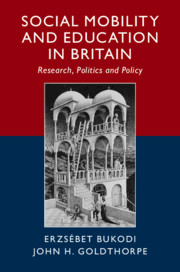Crossref Citations
This Book has been
cited by the following publications. This list is generated based on data provided by Crossref.
Bukodi, Erzsébet
Bourne, Mollie
and
Betthäuser, Bastian
2019.
Cognitive Ability, Lifelong Learning, and Social Mobility in Britain: Do Further Qualifications Provide Second Chances for Bright People from Disadvantaged Backgrounds?.
European Sociological Review,
Vol. 35,
Issue. 1,
p.
49.
Bukodi, Erzsébet
Paskov, Marii
and
Nolan, Brian
2019.
Intergenerational Class Mobility in Europe: A New Account.
Social Forces,
Hoskins, Kate
and
Barker, Bernard
2020.
STEM, Social Mobility and Equality.
p.
133.
Edmonstone, John
2020.
A tale of two ethoses: neoliberalism and action learning.
Action Learning: Research and Practice,
Vol. 17,
Issue. 3,
p.
259.
O’Brien, Dave
2020.
Class and the problem of inequality in theatre.
Studies in Theatre and Performance,
Vol. 40,
Issue. 3,
p.
242.
Bukodi, Erzsébet
and
Paskov, Marii
2020.
Intergenerational Class Mobility among Men and Women in Europe: Gender Differences or Gender Similarities?.
European Sociological Review,
Vol. 36,
Issue. 4,
p.
495.
Scott, John
2020.
British Sociology.
p.
141.
Kuha, Jouni
Bukodi, Erzsébet
and
Goldthorpe, John H.
2021.
Mediation analysis for associations of categorical variables: The role of education in social class mobility in Britain.
The Annals of Applied Statistics,
Vol. 15,
Issue. 4,
Bukodi, Erzsébet
and
Goldthorpe, John H
2021.
‘Primary’ Factors in Intergenerational Class Mobility in Europe: Results from the Application of a Topological Model.
European Sociological Review,
Vol. 37,
Issue. 1,
p.
1.
Betthäuser, Bastian A.
Bukodi, Erzsébet
and
Bourne, Mollie
2021.
The case for studying the intergenerational transmission of social (dis)advantage: A reply to Gary Marks.
The British Journal of Sociology,
Vol. 72,
Issue. 2,
p.
233.
Ruggera, Lucia
2021.
Licensed professions: a new look at the association between social origins and educational attainments in Italy.
Higher Education,
Vol. 82,
Issue. 2,
p.
369.
Bernardi, Fabrizio
and
Gil-Hernández, Carlos J
2021.
The Social-Origins Gap in Labour Market Outcomes: Compensatory and Boosting Advantages Using a Micro-Class Approach.
European Sociological Review,
Vol. 37,
Issue. 1,
p.
32.
Angelopoulos, Angelos
Angelopoulos, Konstantinos
Lazarakis, Spyridon
and
Philippopoulos, Apostolis
2021.
The distributional consequences of rent‐seeking.
Economic Inquiry,
Vol. 59,
Issue. 4,
p.
1616.
Buscha, Franz
Gorman, Emma
and
Sturgis, Patrick
2021.
Spatial and social mobility in England and Wales: A sub‐national analysis of differences and trends over time.
The British Journal of Sociology,
Vol. 72,
Issue. 5,
p.
1378.
Martin, Jane
2022.
Gender and Education in England since 1770.
p.
1.
Nunn, Alexander
and
Tepe, Daniela
2022.
Disciplinary Neo-Liberalisation and the New Politics of Inequality.
The British Journal of Criminology,
Vol. 62,
Issue. 5,
p.
1305.
Saeed, Aqsa
2022.
Education, Aspiration and Upward Social Mobility.
p.
59.
Farrall, Stephen
Gray, Emily
Nunn, Alexander
and
Tepe-Belfrage, Daniela
2022.
Global pressures, household social reproduction strategies and compound inequality.
New Political Economy,
Vol. 27,
Issue. 4,
p.
713.
Saeed, Aqsa
2022.
Education, Aspiration and Upward Social Mobility.
p.
1.
Bann, David
Wright, Liam
Goisis, Alice
Hardy, Rebecca
Johnson, William
Maddock, Jane
McElroy, Eoin
Moulton, Vanessa
Patalay, Praveetha
Scholes, Shaun
Silverwood, Richard J.
Ploubidis, George B.
and
O’Neill, Dara
2022.
Investigating change across time in prevalence or association: the challenges of cross-study comparative research and possible solutions.
Discover Social Science and Health,
Vol. 2,
Issue. 1,





